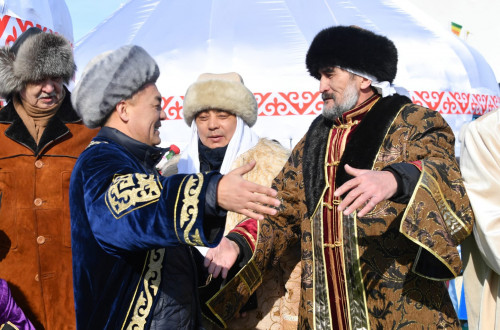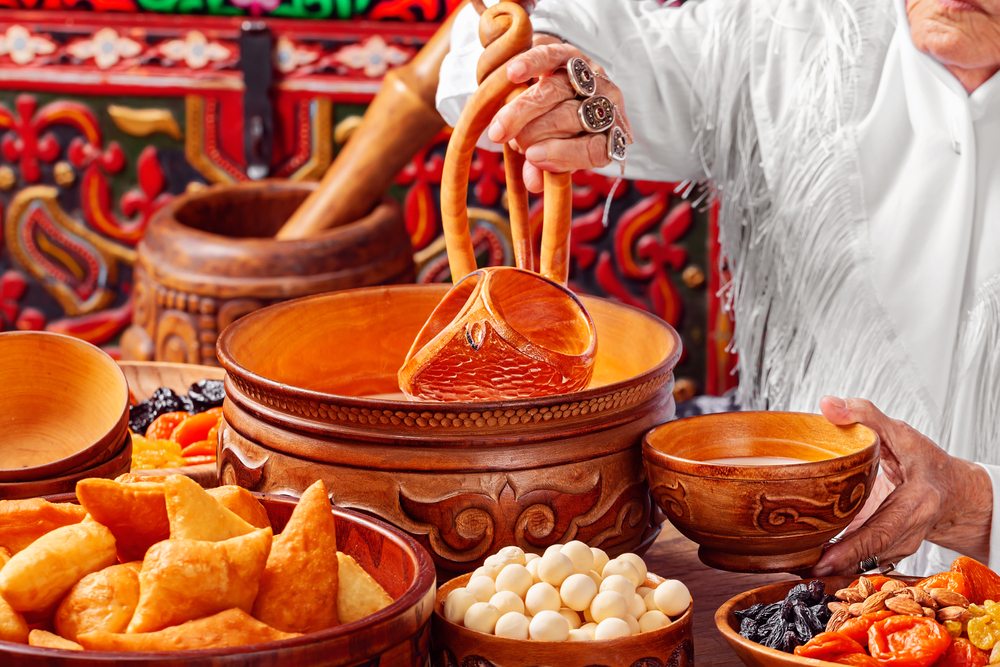ASTANA – Korisu day, celebrated in Kazakhstan on March 14, holds a deep meaning and wide use in society, marking the return of spring with the practice of letting go of old grievances.

Korisu tradition translates as a day of greetings. Photo credit: Yerlan Omar/Egemen.kz
Korisu, translated as greeting, is the beginning of the festive period among Kazakhs, welcoming spring and a new year that culminates in the Nauryz celebrations on March 21-22. In the ancient Eastern calendar, the onset of the month of Hamal (known as Amal in Kazakh) marks the commencement of the Aries constellation, aligning with March 14 in today’s calendar.
During Korisu, it is customary to wake up early and pay visits to the elder members of the family and neighbors – at least three households. It is a time to forgive past grievances, set aside enmity and prepare dastarkhan, the traditional table setting.
Neighbors greet each other with “Bir zhasynmen!” or “Zhasyn kutty bolsyn!” translating to “Happy one year!” or “Happy one birthday!” symbolizing the addition of another year to one’s age.
Kazakh poet Abai Kunanbaiuly’s famous poem on spring describes this moment of relishing the new season after a long winter among neighbors:
“On springtime pastures my people gather;
Kinsmen embrace and rejoice together.
Joking and laughing, they stand and chat,
About everything — from their herds to the weather,” translated by Dorian Rottenberg.

On Korisu day every celebrating household serves traditional food and beverages. Photo credit: shutterstock.com
Based on ancient beliefs in the cyclical nature of the world, Korisu day evokes the hope for something new and is a human way of embracing light and warmth of the spring season.
“Spring is not spring until I celebrate Korisu – or Amal, as we call it – with my family and friends,” said Aigul Mynbai, a native of the Mangystau Region in western Kazakhstan.
There is always an early rise, always guest visits, always hugs and wishes of a blessing. A hug, a wishful prayer and trays laden with traditional food and sweets for the neighbors – those are simple gestures that say a lot about people living side by side, celebrating the turn of a season.
Traditions are all about the memories they hold. According to Mynbai, some of her favorite childhood memories are of Korisu Day, an opportunity to find joy in giving joy.
“I always remember my mother setting large dastarkhan (table) and the feeling of waking up in the morning to the smell of the freshly fried baursak (national puffy bread) and shelpek (national flatbread) by my mom,” said Mynbai.
“Back then, my parents lived with my dad’s parents, so it was usually our house that received more guests. But as kids, we used to run to other houses to get delicious food and sweets. Although I did not really understand the meaning of this day at the time, the feeling that is was a festivity and the sense of togetherness, as we welcomed people in our house and as people welcomed us in theirs, was very vivid. I still reminisce about those moments sometimes,” Mynbai said, now residing in Astana, where such visits are not as widespread.
“It’s heartening that more people across Kazakhstan celebrate this day,” she added.
For adults, perhaps it was less about food festivity and more about reconciliation and forgiveness.
“In our family my grandmother often used to highlight the need to forgive people and to maintain connections with friends and family. ‘Keeping a grudge weighs you down’ she used to say. And Korisu was a perfect opportunity to reconnect and move on from the offences of the past. I never saw her making a grim face towards anyone who came to greet us. I believe she lived by what she preached and set us an example,” said Mynbai.

